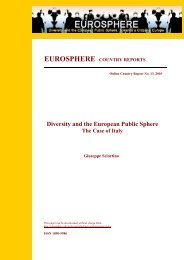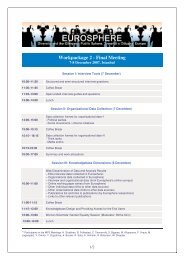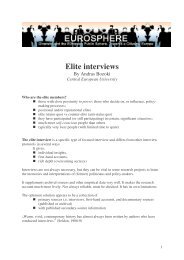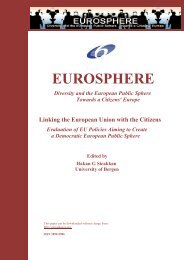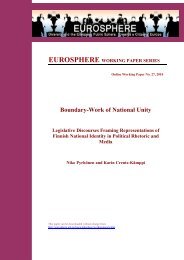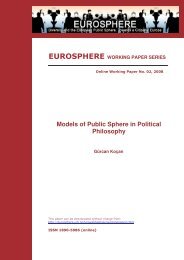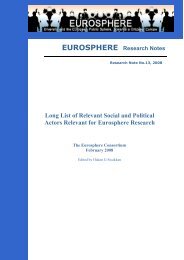Migrants, Minorities, Belongings and Citizenship. Glocalization and ...
Migrants, Minorities, Belongings and Citizenship. Glocalization and ...
Migrants, Minorities, Belongings and Citizenship. Glocalization and ...
Create successful ePaper yourself
Turn your PDF publications into a flip-book with our unique Google optimized e-Paper software.
language skills, <strong>and</strong> organizational resources close to the fieldwork sites. A close look at<br />
the six country reports, which are attached to this report, will verify this statement.<br />
Through collaboration between European partners who have in-depth knowledge about<br />
their case-countries, we were also able to design context-sensitive qualitative research<br />
tools <strong>and</strong> to interpret the results accordingly. The questionnaire <strong>and</strong> interview items were<br />
refined/reformulated in an interactive process which was based on the project-partners’<br />
in-depth knowledge of their specific case-countries. Some items were reformulated<br />
differently according to the cultural contexts of our cases (the method of functional<br />
equivalence). These research tools were originally prepared in English by the coordinator<br />
<strong>and</strong> translated by the partners into Danish, Estonian, Finnish, German, Hungarian<br />
(partly), Norwegian, Russian, Swedish, <strong>and</strong> Turkish (partly). All these collaborative<br />
activities provided a higher level of precision <strong>and</strong> context-sensitivity in data collection,<br />
interpretation, <strong>and</strong> analysis.<br />
5. Policy implications<br />
The overall objective for this specific key action has been stated by the European<br />
Commission as “to improve underst<strong>and</strong>ing of the structural changes taking place in<br />
Europe, to identify options for the management of change <strong>and</strong> to involve European<br />
citizens more actively in shaping their own futures. This will require the analysis of the<br />
main trends giving rise to these changes; of the relationships between technology,<br />
employment <strong>and</strong> society, the re-appraisal of participation mechanisms for collective<br />
action at all levels of governance <strong>and</strong> the elaboration of new development strategies<br />
fostering growth employment <strong>and</strong> economic <strong>and</strong> social cohesion”.<br />
The proposal of the Glocalmig Consortium was to develop novel research tools for<br />
investigating the quality of citizenships in the light of the structural changes in six<br />
European countries. Quality of citizenships is defined in terms of alignments <strong>and</strong><br />
misalignments between the existing citizenship institutions/structures <strong>and</strong> citizens’ <strong>and</strong><br />
residents’ preferences/interests emanating from their diverse belongings. The Glocalmigproject<br />
also promised to design research tools to be used to detect the existing<br />
institutions <strong>and</strong> structures that are inclusive <strong>and</strong> democratic enough <strong>and</strong> that can be used<br />
to eliminate misalignments as well as to propose alternative ways of reducing the<br />
misalignments. These research tools have been successfully tested, <strong>and</strong> the knowledge<br />
that is created is through their use is novel <strong>and</strong> has certain potential policy implications.<br />
However, although Glocalmig’s theoretical <strong>and</strong> conceptual results have a validity beyond<br />
the scope of this project, it should be kept in mind that the empirical results of Glocalmig<br />
107



